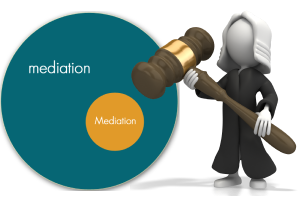Mediation is an informal procedure for resolving commercial disputes in which an independent adviser acts as an intermediary between all parties to the case and assists them in finding a mutually beneficial solution to the conflict. The participants can manage the mediation procedure, which is an advantage of this method of resolving a commercial dispute.
Arbitration and mediation are two of the most popular ADR methods, each with its own set of advantages and disadvantages that must be considered before proceeding. In the process of resolving financial conflicts, specialists use mediation, negotiation, conciliation, and arbitration. In this article, we will go over all of the nuances involved in resolving an international dispute through mediation.
Even though mediation is a collaborative decision that the courts facilitate in order to resolve an economic dispute, it is worth remembering that denying to facilitate a proposal for mediation could harm the party's position if the lawsuit is later taken to trial.
The Advantages of Mediation in Dispute Resolution
The primary advantages of using mediation to settle differences are as follows:
- A conflict takes an average of one day to help solve.
- A corporate disagreement can be solved soon, even faster than in court.
- Savings on costs – attempting to resolve a conflict through mediation is less expensive than going to trial.
- Because of privacy, the process is less disruptive to business.
- Participants consider all possible solutions in collaboration with the mediator.
- The ability to control the procedure – the parties choose the mediation procedure voluntarily.
- Without interference from a third person, the parties independently choose the best solution for each other.
- The sides' collaborative efforts result in the creation of a workable compromise.
- Opportunity to maintain business relationships between participants through complex mediation tasks, which can serve as a solid basis for future bargaining.
- Even though mediation is not legally enforceable, it may result in the signing of a legally binding agreement that has the same force as a court order.
Because mediation can be used at any stage of conflict resolution, it can be the first step in resolving an international business dispute if negotiations fail. This method can also be used in legal and arbitration proceedings.
There are times when mediation is not the best way to settle financial disputes. Mediation may not be an appropriate method if one of the parties has intentionally violated its agreements and is willing to participate in conflict resolution processes that require the cooperation of both parties.
Аgreement on mediation
Mediation is a non-formalized proceeding in which any action is dependent on the consent of all parties. The participants' agreement to submit the dispute to mediation is the first step in starting this procedure. Such an agreement can be included in an agreement that governs the parties' commercial relationship or in a separate contract relating to a specific conflict that has arisen.
The mediation agreement serves as the procedure's foundation, containing the mediation requirements as well as the mediator's duties and responsibilities. The parties reach such an agreement immediately before meditation.
The main terms of the cooperation agreement are as follows:
- it is mostly prepared by the mediator;
- it cannot include items that have not been agreed upon in advance by all participants;
- the parties must unconditionally endorse it;
- the presence of clauses outlining the procedure for resolving the dispute in great detail.
The legal status of the mediation agreement is determined by the type of process and the intentions of the participants. Court-related mediation may result in a legally binding outcome, whereas mediation that is not part of another process may have a legal effect determined by the participants. In order for the agreement to be drawn up in accordance with all legal norms and to have the contractual force, the parties to the conflict may invite a lawyer during the mediation process.
Using Mediation to Resolve an International Dispute: The Mediation Process
Mediation allows the parties to decide how to resolve the dispute on their own. The mediator guides and assists the parties in identifying the problem, understanding each other's points of view, and reaching a mutually beneficial decision during this process.
Mediators use two main approaches to assist disputing parties in making decisions. These methods correspond to two mediation models used around the world:
- The mediator enables relationships between the team and aids participants in understanding the opponent's status in comparison to the disagreement.
- Evaluative mediation takes place when the mediator offers an evaluation of the conflict that can be accepted or rejected as a remedy to the conflict.
In any case, it is important to keep in mind that only the sides can make a decision which of the transition process is best for resolving their conflict.
Mediation for dispute resolution implies that the mediation process includes the following stages:
- In order to begin the procedure for resolving a financial dispute, participants must submit a request for mediation. If the case is already being considered by the arbitration court, the parties can ask their arbitration administrator to send the case to mediation.
- Choosing a mediator – before the procedure can begin, participants must select a mediator.
- The process of resolving a business dispute with the assistance of a mediator in which the parties discuss the case, exchange positions, and seek compromises.
- The stage of concluding a settlement agreement is the settlement of an international dispute. Also, the parties may be unable to reach an agreement, a situation known as «conflict impasse».
Choosing a Mediator to Facilitate the Mediation Process
Before deciding on a mediator, the parties should be aware of the following points:
- A mediator is someone who should be neutral and provide an appropriate assessment of their conflict, as well as mediate in their negotiations, while accompanying them through the process of identifying problems and finding solutions.
- The mediator must have specific experience and training, as well as knowledge of the dispute's subject matter.
- There are complex disputes involving specific or high-tech objects; as a result, the parties can invite co-mediators who are highly specialized specialists in the issues they require in addition to the main mediator.
- The mediator must be completely impartial, with no ties to any of the parties.
- The candidate for the role of mediator must have relevant experience, qualifications, and training to the subject matter of the dispute.
If the parties have applied to an ADR organization, the mediator will be appointed in accordance with the institution's procedural requirements.
The terms for resolving a dispute through mediation can be quite different. The following steps are involved in the mediation and resolution of a financial dispute:
- Obtaining the required information.
- Examine the parties' interests.
- Preparation of options that meet the needs of all parties.
- Existing options are being evaluated.
- Signing a settlement agreement and incorporating it into the contract.
Conclusion
Because mediation is a confidential procedure, businessmen who want to settle an international business dispute use it. As a result, transparency becomes the foundation of the process, shielding the parties from the disclosure of confidential information and its consequences. Mediation costs are split evenly among the participants. The number of issues to be resolved in the process is agreed upon in advance and can be included in the mediation agreement's text or prepared as a separate provision.
Specialists from BusinIncFine can advise you on the issue of initiating proceedings through mediation, as well as provide the necessary assistance in resolving a dispute in Europe, the United States, Asia, and other regions.
FAQ
Mediation is the process by which a neutral third party (mediator) assists people who are in disagreement in reaching a mutually acceptable agreement. The outcome is determined by the mediation participants.
The following are the primary benefits of resolving a dispute through mediation:
- Availability; efficiency; time savings; informality; flexibility; parties control the proceedings; confidentiality
A mediation agreement is a document that defines the nature and terms of the parties' agreement. The legal status of a mediation agreement is determined by the type of process and the parties' intentions.

